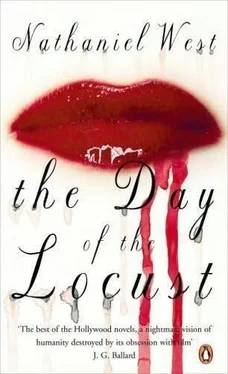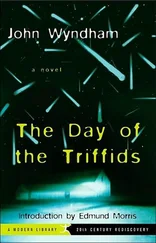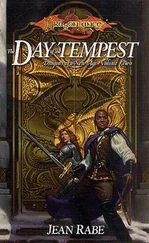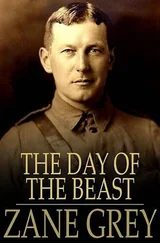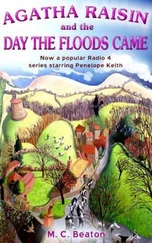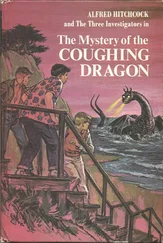Tod understood this time and left. The only exit he could find led through the chapel. The moment he entered it, Mrs. Johnson caught him and directed him to a seat. He wanted badly to get away, but it was impossible to do so without making a scene.
Faye was sitting in the front row of benches, facing the pulpit. She had the Lee sisters on one side and Mary Dove and Abe Kusich on the other. Behind them sat the tenants of the San Berdoo, occupying about six rows. Tod was alone in the seventh. After him were several empty rows and then a scattering of men and women who looked very much out of place. He turned in order not to see Faye’s jerking shoulders and examined the people in the last rows. He knew their kind. While not torch-bearers themselves, they would run behind the fire and do a great deal of the shouting. They had come to see Harry buried, hoping for a dramatic incident of some sort, hoping at least for one of the mourners to be led weeping hysterically from the chapel. It seemed to Tod that they stared back at him with an expression of vicious, acrid boredom that trembled on the edge of violence. When they began to mutter among themselves, he half-turned and watched them out of the corner of his eyes. An old woman with a face pulled out of shape by badly-fitting store teeth came in and whispered to a man sucking on the handle of a home-made walking stick. He passed her message along and they all stood up and went out hurriedly. Tod guessed that some star had been seen going into a restaurant by one of their scouts. If so, they would wait outside the place for hours until the star came out again or the police drove them away.
The Gingo family arrived soon after they had left. The Gingos were Eskimos who had been brought to Hollywood to make retakes for a picture about polar exploration. Although it had been released long ago, they refused to return to Alaska. They liked Hollywood. Harry had been a good friend of theirs and had eaten with them quite regularly, sharing the smoked salmon, white fish, marinated and maatjes herrings they bought at Jewish delicatessen stores. He also shared the great quantities of cheap brandy they mixed with hot water and salt butter and drank out of tin cups.
Mama and Papa Gingo, trailed by their son, moved down the center aisle of the chapel, bowing and waving to everyone, until they reached the front row. Here they gathered around Faye and shook hands with her, each one in turn. Mrs. Johnson tried to make them go to one of the back rows, but they ignored her orders and sat down in front.
The overhead lights of the chapel were suddenly dimmed. Simultaneously other lights went on behind imitation stained-glass windows which hung on the fake oak-paneled walls. There was a moment of hushed silence, broken only by Faye’s sobs, then an electric organ started to play a recording of one of Bach’s chorales, “Come Redeemer, Our Saviour.” Tod recognized the music. His mother often played a piano adaptation of it on Sundays at home. It very politely asked Christ to come, in clear and honest tones with just the proper amount of supplication. The God it invited was not the King of Kings, but a shy and gentle Christ, a maiden surrounded by maidens, and the invitation was to a lawn fete, not to the home of some weary, suffering sinner. It didn’t plead; it urged with infinite grace and delicacy, almost as though it were afraid of frightening the prospective guest.
So far as Tod could tell, no one was listening to the music. Faye was sobbing and the others seemed busy inside themselves. Bach politely serenading Christ was not for them.
The music would soon change its tone and grow exciting. He wondered if that would make any difference. Already the bass was beginning to throb. He noticed that it made the Eskimos uneasy. As the bass gained in. power and began to dominate the treble, he heard Papa Gingo grunt with pleasure. Mama caught Mrs. Johnson eyeing him, and put her fat hand on the back of his head to keep him quiet.
“Now come, 0 our Saviour,” the music begged. Gone was its diffidence and no longer was it polite. Its struggle with the bass had changed it. Even a hint of a threat crept in and a little impatience. Of doubt, however, he could not detect the slightest trace.
If there was a hint of a threat, he thought, just a hint, and a tiny bit of impatience, could Bach be blamed? After all, when he wrote this music, the world had already been waiting for its lover more than seventeen hundred years. But the music changed again and both threat and impatience disappeared. The treble soared free and triumphant and the bass no longer struggled to keep it down. It had become a rich accompaniment. “Come or don’t come,” the music seemed to say, “I love you and my love is enough.” It was a simple statement of fact, neither cry nor serenade, made without arrogance or humility.
Perhaps Christ heard. If He did, He gave no sign. The attendants heard, for it was their cue to trundle on Harry in his box. Mrs. Johnson followed close behind and saw to it that the casket was properly placed. She raised her hand and Bach was silenced in the middle of a phrase. “Will those of you who wish to view the deceased before the sermon please step forward?” she called out.
Only the Gingos stood up immediately. They made for the coffin in a group. Mrs. Johnson held them back and motioned for Faye to look first. Supported by Mary Dove and the Lee girls, she took a quick peek, increased the tempo of her sobs for a moment, then hurried back to the bench.
The Gingos had their chance next. They leaned over the coffin and told each other something in a series of thick, explosive gutturals. When they tried to take another look, Mrs. Johnson herded them firmly to their seats.
The dwarf sidled up to the box, made a play with his handkerchief and retreated. When no one followed him, Mrs. Johnson lost patience, seeming to take what she understood as a lack of interest for a personal insult. “Those who wish to view the remains of the late Mr. Greener must do so at once,” she barked.
There was a little stir, but no one stood up.
“You, Mrs. Gail,” she finally said, looking directly at the person named. “How about you? Don’t you want a last look? Soon all that remains of your neighbor will be buried forever.”
There was no getting out of it. Mrs. Gail moved down the aisle, trailed by several others.
Tod used them to cover his escape.
Faye moved out of the San Berdoo the day after the funeral. Tod didn’t know where she had gone and was getting up the courage to call Mrs. Jenning when he saw her from the window of his office. She was dressed in the costume of a Napoleonic vivandière. By the time he got the window open, she had almost turned the corner of the building. He shouted for her to wait. She waved, but when he got downstairs she was gone. From her dress, he was sure that she was working in the picture called “ Waterloo.” He asked a studio policeman where the company was shooting and was told on the back lot. He started toward it at once. A platoon of cuirassiers, big men mounted on gigantic horses, went by. He knew that they must be headed for the same set and followed them. They broke into a gallop and he was soon outdistanced.
The sun was very hot. His eyes and throat were choked with the dust thrown up by the horses’ hooves and his head throbbed. The only bit of shade he could find was under an ocean liner made of painted canvas with real lifeboats hanging from its davits. He stood in its narrow shadow for a while, then went on toward a great forty-foot papier mâché sphinx that loomed up in the distance. He had to cross a desert to reach it, a desert that was continually being made larger by a fleet of trucks dumping white sand. He had gone only a few feet when a man with a megaphone ordered him off.
Читать дальше
